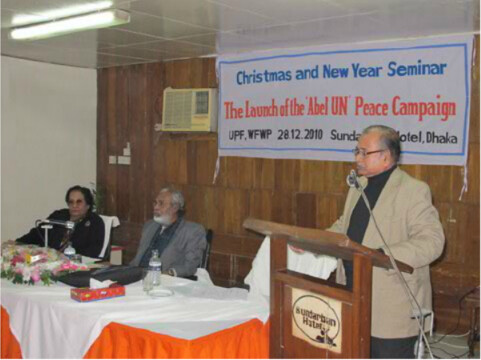Dhaka, Bangladesh - UPF and the Women's Federation for World Peace (WFWP) jointly organized a seminar promoting interfaith understanding on Dec. 28, 2010 at the Sundarban Hotel. Forty-three Ambassadors for Peace, religious leaders, and NGO leaders attended.
After the welcome remarks by Mrs. Zeenat Ara Bhuiyan (President of WFWP-Bangladesh), Dr. Kazi Nurul Islam (Professor and Chairman of the Department of World Religions, Dhaka University) reported about interfaith activism for peace and introduced the UN’s resolution calling the first week of February the Week of Interfaith Dialogue. Sharing his experiences in interfaith activities, he mentioned that it is high time that religions, in spite of historical difference, seek to unite all men and women to work for world peace rather than to divide and destroy. He emphasized that the purpose of interreligious dialogue is not to debate but to learn and grow in one's perception and understanding of truth and act accordingly.
Mrs. Shireen Rahman (Secretary General of WFWP-B) introduced the value of the family and described the seminars held on the International Day of Families, the Parents' Day, and the first WFWP-Asia conference. Most importantly, the family is the school of love and ethics.
Rev. Tetsuya Amano reported about the successful activities of UPF's Character Education Initiative at Dhaka University. It focuses on universal values and core ethical principles common to all cultures. Students not only learn the principles but implement them in their communities.
Prof. Dr. M. Shamsher Ali (Chairman of UPF-Bangladesh) expressed appreciation for the successful activities of UPF and WFWP and encouraged people to organize even more attractive programs that will advance their missions. He mentioned that today’s global crisis is not only a financial crisis and not only a crisis of ongoing conflict and violence, but more fundamentally, we face a growing moral and spiritual crisis and a crisis that undermines the core social institution, the family. He concluded by describing the character and the principles of true love for our families, our communities, our nations, and the entire human family.
Each religious leader shared his or her interpretation of the "Prayer of Peace" attributed to St. Francis, and lastly everyone in the room recited the prayer together:
Lord, make us instruments of your peace.
Where there is hatred, let us sow love;
where there is injury, pardon;
where there is discord, union;
where there is doubt, faith;
where there is despair, hope;
where there is darkness, light;
where there is sadness, joy.
Grant that we may not so much seek to be consoled as to console;
to be understood as to understand;
to be loved as to love.
For it is in giving that we receive;
it is in pardoning that we are pardoned;
and it is in dying that we are born to eternal life. Amen.

